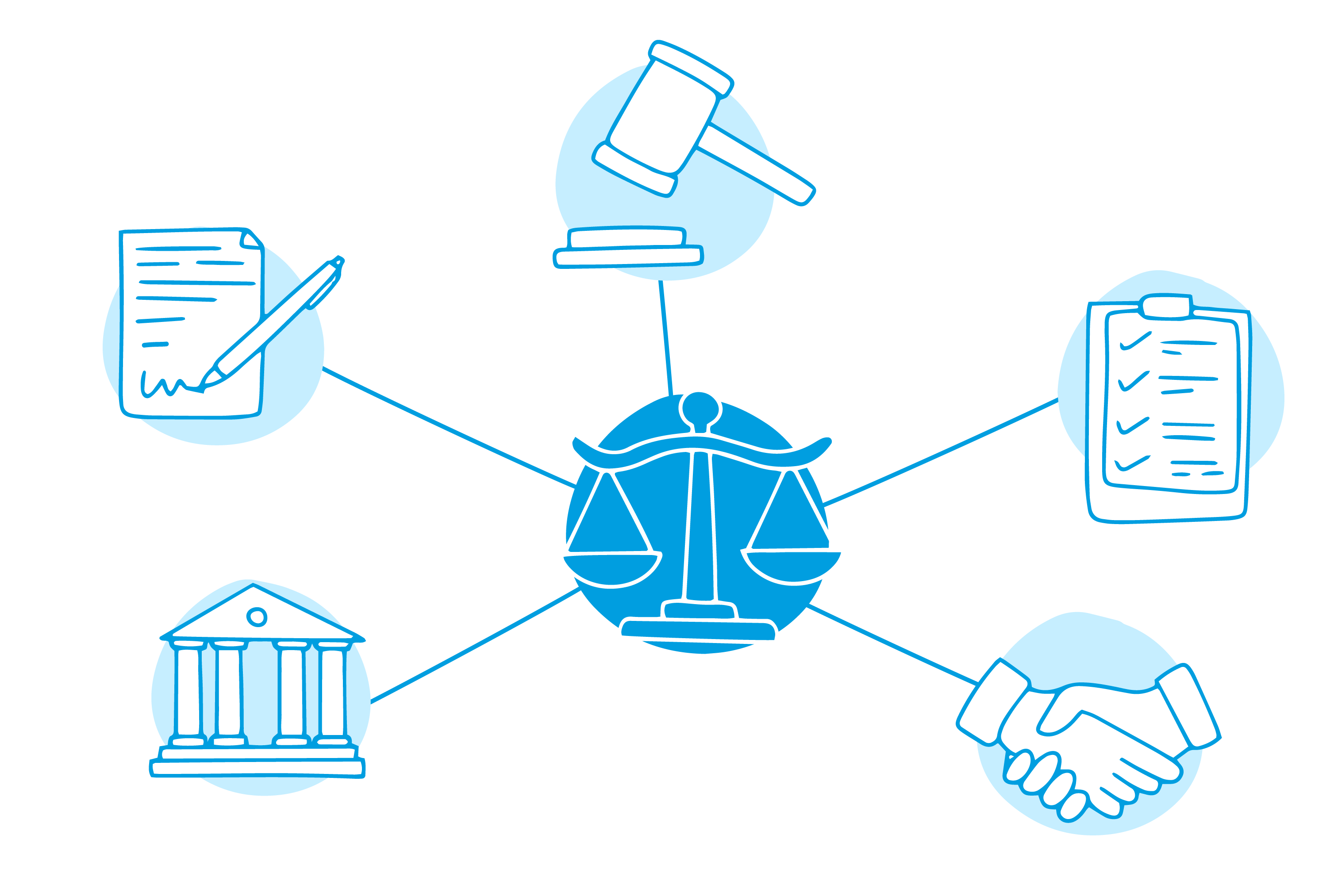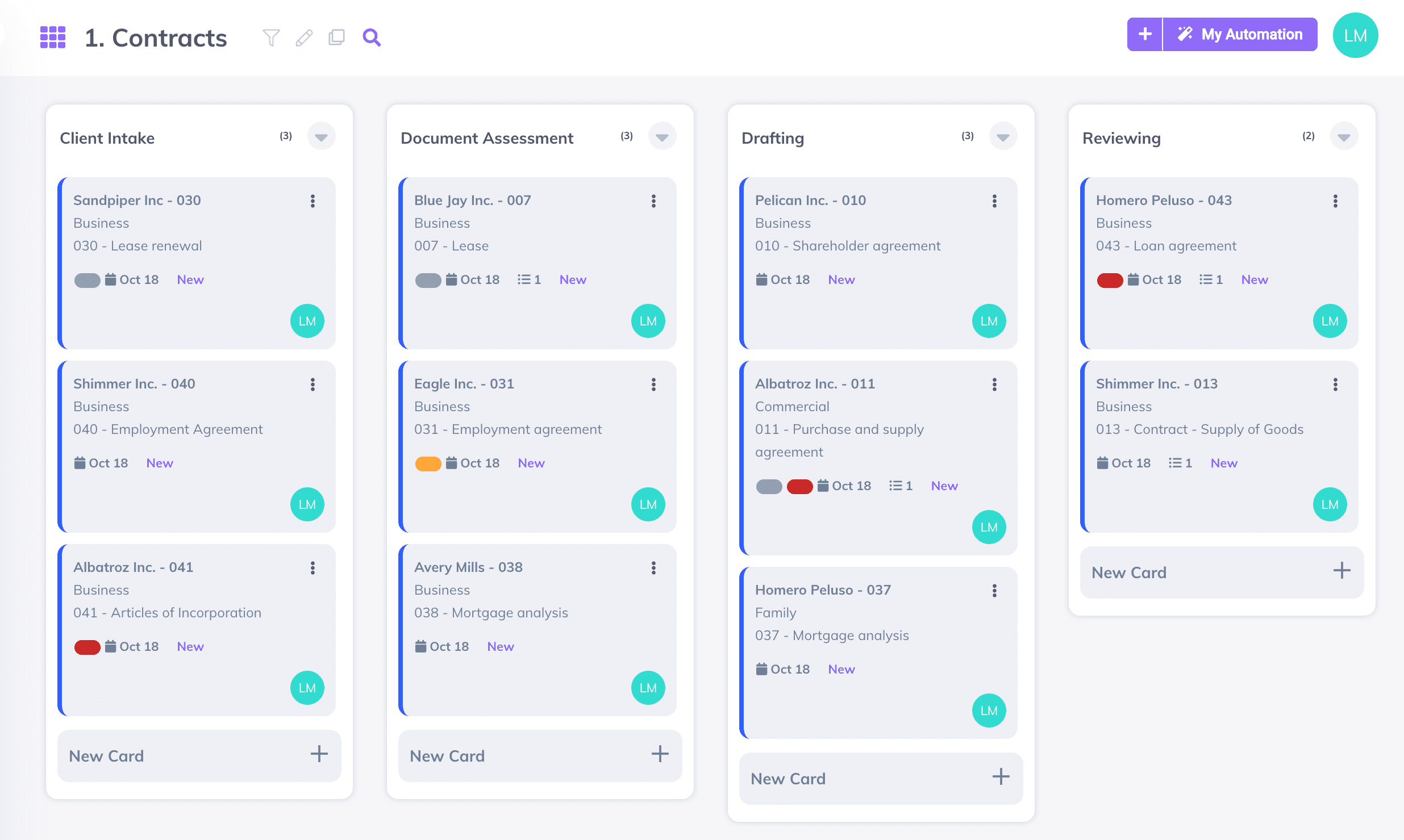What is Legal Kanban?
Lilian Mateu
Kanban is a work management method designed to improve services and facilitate an evolutionary change management, promoting business agility. Its results and benefits are already well known in the technology sector, especially since 2010.
Over time, its implementation has spread to all areas and business sectors, such as finance, marketing and human resources, reaching also legal services.
Legal Kanban is the term used to refer to the Kanban Method applied to the particularities of the services developed by teams and organizations in the legal sector.

Echoing this reality, Kanban University has developed an accredited training program tailored to legal professionals, called Legal Kanban Practitioner.
Netmind has been offering Kanban training for more than 10 years and has been a Kanban University Partner since 2018. As a leader in training and consulting in business agility aimed at organizations in the legal sector, we are the first company to provide certified training and coaching in Legal Kanban in both Spanish and English.
Enabling digital transformation
With Legal Kanban, legal services professionals can better cope with the accelerated digital transformation that the industry is undergoing. Legal services clients, especially businesses, are becoming increasingly demanding and are asking to receive higher value services that are more digital, faster, more flexible and more in line with their current needs.
A shift in focus is needed to put the customer at the center in order to better adapt to his needs.
Despite the accelerated social, economic and technological changes experienced over the last decades, it is well known that, in general, most lawyers and professionals in the legal sector are still anchored in the most traditional ways of managing work, teams and client relationships, with pyramidal, bureaucratic, silo-based structures and a culture that is sometimes individualistic and hierarchical.
The biggest challenge of the sector is transformation and, with it, change management, from many points of view: integration of new ways of thinking, designing, managing and evolving legal services, adopting new tools, new forms of relationship and collaboration and new organizational structures.
By implementing Legal Kanban, the creation of agile legal teams and organizations is gradually achieved, capable of reinventing themselves and adapting better and faster to the new rhythms and expectations of clients, offering new ways of creating value.
Legal Kanban is the key that opens the door to agility for legal professionals.
Towards business agility
Incorporating organizational and business agility in the legal sector implies changing the way things are done and this requires a cultural evolution.
Legal Kanban encourages a critical review of the values that shape the culture of organizations in the sector, of the habits that are adopted, of the patterns of interaction and collaboration, of the processes that are followed and of all the behaviors that determine the way of working and relating.
The Kanban Method is defined as an alternative path for professional services to business agility, understood as the ability of organizations to adapt to new contexts and respond quickly to constant change.
Legal Kanban enables the legal sector to integrate a culture of accepting and leveraging change. Evolutionary change management, through continuous improvement as opposed to rigid work plans, is one of the pillars of the Method.
To foster the initiation of agility and its application in teams and organizations in the legal environment, Kanban has two simple premises at its roots:

Instead of managing and controlling workers we should manage and control the amount of work in progress and let workers organize around it.

We must start by working in the same way we do now, and adapt by gradually evolving in order to fully satisfy customer expectations, while operating a profitable and sustainable business.
Legal Kanban promotes evolutionary change management based on continuous improvement
Legal Kanban offers professionals, teams and organizations in the legal sector a Method to facilitate a transformation of legal services, based on cultural change and observed at the organizational level, in processes and ways of organizing work, and oriented towards continuous improvement of services with a focus on people and clients.
Any agile transformation, if it is to take hold, must be evolutionary and take place at different levels. Legal Kanban does not intend for us to become obsessed with implementing a disruptive and dramatic restructuring of teams, organizations and services, or to frantically adopt frameworks, methodologies or technology for their own sake. Instead, it proposes a gradual evolution with incremental changes as they are needed.
How to reduce resistance to change?
Drastic social and organizational changes only serve to slow down companies. Legal Kanban realizes that in order to successfully manage any transformation in the legal sector, the biggest obstacle we face is always resistance to change.
Changing the way we think, the way we behave, how we work, how we organize and collaborate is a challenge for leaders, managers and all people. Humans personally experience all social and organizational changes.
What is probably the biggest difficulty for the legal sector is the disinterest in change, given that transforming implies, in a broad sense, changing the traditional working and business model, which is deeply rooted, and generally quite profitable.
Therefore, our first strategy at Legal Kanban with change management should always be to avoid introducing organizational structural social changes whenever and wherever possible.
We must be skillful in the way we introduce changes in our organizations, especially those related to technology or any kind of structural change. Legal Kanban encourages transformation through the introduction of incremental changes, which is smarter because they have a side effect, which is that over time social and structural change will occur, but in an emergent way and will not meet resistance.
Only if we get into the habit of reflecting on what we do, how we do it, for what purpose, to better understand and respond to our customers’ needs, will we evolve. It is about implementing a culture of collaborative continuous improvement through organizational learning with the goal of changing results.
Legal Kanban to improve work management
The core of Legal Kanban’s evolutionary change approach is that we must introduce changes gradually and incrementally in e.g. the digital tools we use and in the methods of work and organization, but we must avoid introducing changes that attack the identity and dignity of people or the social structure around us.
The key to initial Legal Kanban is to get the perspective changed and make sure that it is the work that is managed and not the people, the lawyers. We focus initially on understanding that we should focus on optimizing the process of performing the set of activities that bring value to the client, internal or external, and not on worrying about whether we are all busy enough.
Therefore, Legal Kanban promotes a change in the vision of the work of legal professionals as a service, which starts from a request for a job to be done to its delivery, going through different stages of value creation that we must manage.
Thus, we must ensure that we have the adequate capacity to carry out the committed work required by each request and that we will manage and deliver it in the agreed manner and time.
The provision of legal services is a process with different stages of value creation that Legal Kanban helps to optimize
Since legal work is intangible by nature, to manage and improve this knowledge in an agile way, we must start by visualizing it, ensuring that all team members and the organization literally have the “same image”.
To this end, at Legal Kanban we first implement the visual management of work processes, through the so-called “kanban boards” adapted to each legal service provided. The work, represented by post-its or digital cards that incorporate the tasks to be performed, has to flow through different phases of the process.

When we can all see and understand how work is progressing, or not, and what is causing delays, bottlenecks, dependencies, etc. … we will be able to better manage work (not people) and eventually create so-called “kanban systems”, which are workflow systems. By using visual signals (“kan” “ban”), we will progressively limit the amount of Work In Progress (WIP), which is the work we are doing at the same time (usually too much), by establishing rules or prioritization policies.
From there, we can start creating so-called Pull systems in which work is “pulled” (from within) only when there is capacity to do it, instead of “pushing” (from outside) the work, even when there is an overload.
In Legal Kanban, we limit the work in progress, in order to balance the demand in the system, ensuring that work “flows” properly according to the capacity of people and teams. Monitoring workflow and measuring results provides us with key information on how to manage customer expectations, predict risks and improve.
On the other hand, we will establish feedback mechanisms to coordinate and improve the way we work and deliver the service. Strengthening collective learning capabilities through metrics, periodic meetings and appropriate reviews, known as “cadences”, will be the key to evolutionary change.
Legal Kanban is a collaborative improvement method. Through the common design and implementation of small changes, called “experiments”, based on the verification of the fulfillment of hypotheses, and then incorporating them or backtracking easily, an experimental evolution is reached.
In developing the Kanban Method, the main motivation of David J. Anderson,
its originator, was primarily to find a way to manage and improve professional service businesses of all kinds, making them more profitable.
His goal was to create a human approach to change that was compatible with the human condition: to recognize that humans are not so much resistant to change as they are resistant to being changed. Legal Kanban’s goal is to create evolutionary DNA within legal firms.